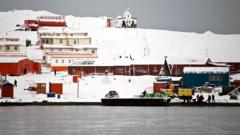"This landmark agreement promises new hope for Chagossians and reinforces the importance of rights and return for displaced communities."
"Historic Sovereignty Shift: UK to Hand Over Chagos Islands to Mauritius"

"Historic Sovereignty Shift: UK to Hand Over Chagos Islands to Mauritius"
"Pope Leo XIV praises UK's decision, marking a crucial win for Chagossians."
In a significant development, Pope Leo XIV has expressed his joy over the UK's recent agreement to transfer the Chagos Islands to Mauritius, deeming the decision a "significant victory" for the Chagos Refugees Group. The Pope's remarks followed a meeting with a delegation of Chagossian refugees in Vatican City, where he highlighted the potential for repairing a "grave injustice" faced by the displaced community.
Under a treaty signed in May, Mauritius will gain sovereignty over the islands while permitting the US and UK to maintain military operations on Diego Garcia for an initial period of 99 years. The Pope expressed hope that Mauritian authorities will facilitate the return of refugees to their homeland. However, the deal has drawn criticism from UK opposition leaders and some Chagossians living in the UK.
Speaking in French, Pope Leo emphasized the encouraging prospect of returning to the Chagos archipelago, describing it as both a sign of hope and a symbol of respect for individual rights. The UK acquired the islands for £3 million in 1968, but Mauritius has maintained that their relinquishment for independence was coerced. The local population was displaced to make way for a military base, leading many Chagossians to relocate to Mauritius, the Seychelles, or the UK.
The agreement involves substantial financial commitments, with the UK slated to pay Mauritius an average of £101 million annually for the next 99 years. Additionally, a 24-mile buffer zone around Diego Garcia has been established, restricting development without UK approval. Access to other islands will be tightly controlled, with the UK retaining the power to veto any civilian or military presence.
The Conservative government has branded the deal as "an act of national self-harm," citing heightened vulnerability to China due to the enhanced ties with Mauritius. Despite this, Prime Minister Sir Keir Starmer argued that the agreement is vital for the UK’s national security, claiming that failure to comply could allow foreign nations to establish bases in the region. Meanwhile, Mauritian Attorney General Gavin Glover celebrated the end of a 60-year struggle for sovereignty.
As both the UK and Mauritian parliaments review the treaty, challenges to the agreement persist. A recent legal attempt by two women born in Diego Garcia to revisit their right to return was dismissed by the High Court, reaffirming the complexities surrounding this long-standing dispute.
Under a treaty signed in May, Mauritius will gain sovereignty over the islands while permitting the US and UK to maintain military operations on Diego Garcia for an initial period of 99 years. The Pope expressed hope that Mauritian authorities will facilitate the return of refugees to their homeland. However, the deal has drawn criticism from UK opposition leaders and some Chagossians living in the UK.
Speaking in French, Pope Leo emphasized the encouraging prospect of returning to the Chagos archipelago, describing it as both a sign of hope and a symbol of respect for individual rights. The UK acquired the islands for £3 million in 1968, but Mauritius has maintained that their relinquishment for independence was coerced. The local population was displaced to make way for a military base, leading many Chagossians to relocate to Mauritius, the Seychelles, or the UK.
The agreement involves substantial financial commitments, with the UK slated to pay Mauritius an average of £101 million annually for the next 99 years. Additionally, a 24-mile buffer zone around Diego Garcia has been established, restricting development without UK approval. Access to other islands will be tightly controlled, with the UK retaining the power to veto any civilian or military presence.
The Conservative government has branded the deal as "an act of national self-harm," citing heightened vulnerability to China due to the enhanced ties with Mauritius. Despite this, Prime Minister Sir Keir Starmer argued that the agreement is vital for the UK’s national security, claiming that failure to comply could allow foreign nations to establish bases in the region. Meanwhile, Mauritian Attorney General Gavin Glover celebrated the end of a 60-year struggle for sovereignty.
As both the UK and Mauritian parliaments review the treaty, challenges to the agreement persist. A recent legal attempt by two women born in Diego Garcia to revisit their right to return was dismissed by the High Court, reaffirming the complexities surrounding this long-standing dispute.






















